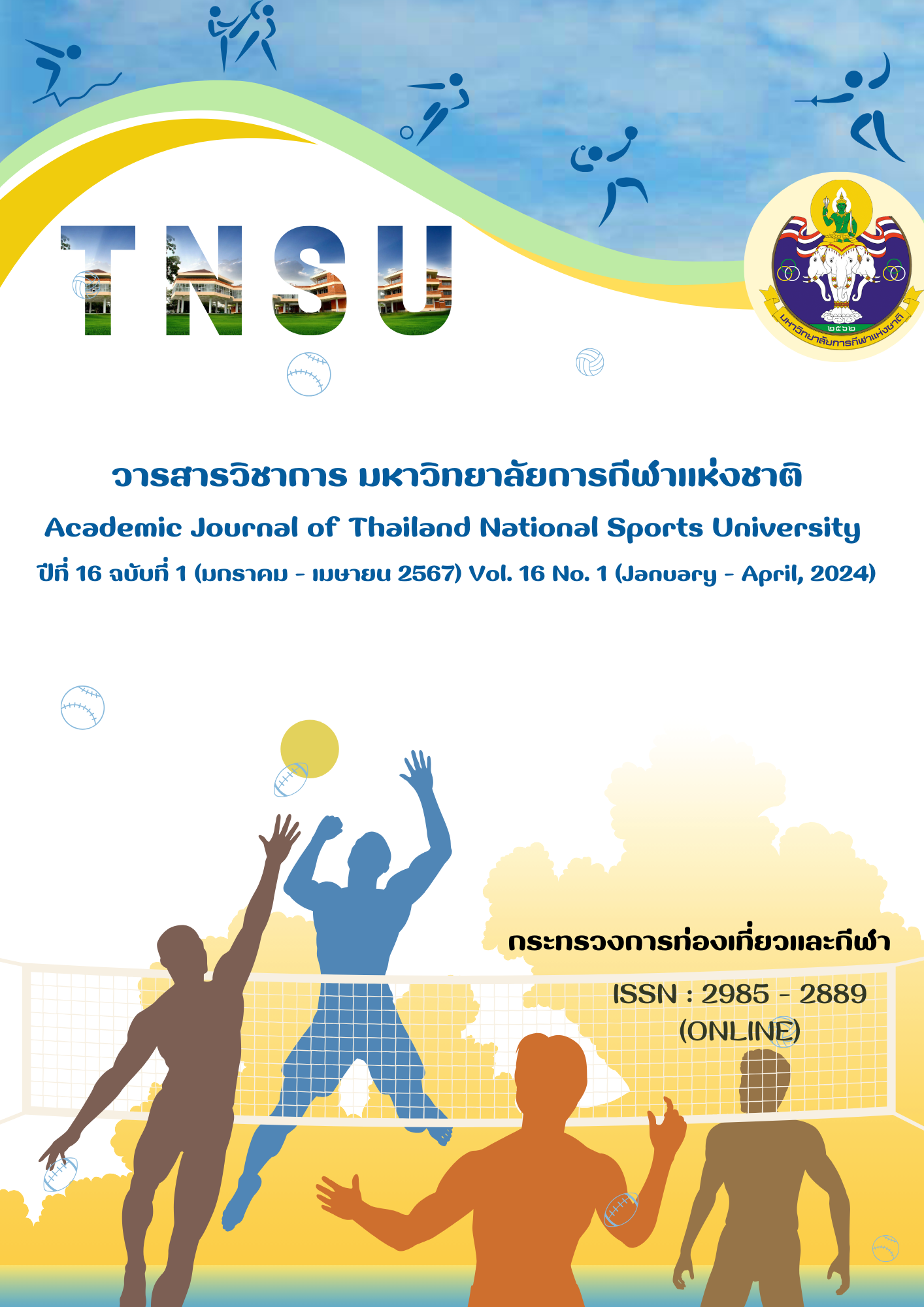COMPETENCY DEVELOPMENT OF TOURIST GUIDES FOR SPORTS TOURISM SERVICES IN THE CENTRAL REGION
Main Article Content
Abstract
The purpose of this research was to explore the competency components of tour guides for sports tourism services in the central region and to propose guidelines for the development of tour guide competencies for supporting sports tourism services in the central region. The study used a mixed research methodology. The samples were classified into two groups: 1) the samples for an interview and focus group consisted of 10 guides with knowledge and experience in sports tourism and purposive sampling was used. Semi - structured interviews were used as research tools. And 2) The samples for a survey comprised 400 guides who have received a tour guide license from the Department of Tourism in the central region. The questionnaire was used as the research instrument. The tool quality was tested by determining the Index of Item Objective Congruence (IOC), getting the IOC from 0.66 to 1.00. Using the alpha coefficient to determine the questionnaire's reliability, the confidence value was 0.865.
Descriptive statistics were used to analyze the data and analysis of the competency factors for tour guides. The Maximum Likelihood (ML) technique was used to evaluate consistency. The relative chi - square (Chi - square/df), the relative consistency index (NFI), and the comparative consistency index were the three main statistics used to confirm the consistency of indicators with empirical data (CFI), and values for the RMSEA (Root Mean Square Error of Approximation).
The study made the following significant discoveries: 1) the component weights of tour guides for supporting sports tourist services in the central region were found to be all positive and statistically significant at the.01 levels for all items, which was a significant finding. Knowledge competency (KL), which had a standard weight of 0.99, came in first, followed by character competency (AB), which had a standard weight of 0.91. The standard component weight for Skilled Performance (SK) is 0.90. and 2) Guidelines for the development of tour guide competencies for supporting tourism services in the central region: 2.1) promote knowledge of sports tourism services; 2.2) Improve tour guide role characteristics, and 2.3) Improve tour guide attitudes.
Article Details

This work is licensed under a Creative Commons Attribution-NonCommercial-NoDerivatives 4.0 International License.
The published article is a copyright of the Academic Journal of Thailand National Sports University. The passage appeared in each article in this academic journal is a perspective of each author which is not related to the journal. Each author is required to be responsible for all components of his/her own article. If there are any mistakes, each author must be responsible for those mistakes on his/her own.
References
Creswell, J. W. (2014) A Concise Introduction to Mixed Methods Research. Sage Publications: Thousand Oaks.
Denzin, N. K. (2012). Triangulation 2.0. Journal of Mixed Methods Research, 6(2), 80 – 88.
Department of Tourism. (2018). Number of tourism personnel. Retrieved from https://www.dot.go.th/department/getIndexMaster/
Fernandes, C. (2011). Cultural planning and creative tourism in an emerging tourist destination. International Journal of Management Cases, 13(3), 629 – 636.
Jarupha Sinsuksrivilai, Phornkanok Bumrungchart, & Suphaphorn Prasongtan. (2016). A comparison of the work performance of tour guides who have completed tourism and hotel courses. and tour guides who have completed the tour guide training course throughout the year in view of domestic tour operators Bangkok. The 13th Kasetsart University Kamphaeng Saen National Conference. (pp. 2462 - 2472). Kasetsart University Kamphaeng Saen Campus.
Kolb, S. M. (2012). Grounded theory and the constant comparative method: Valid 254 research strategies for educators. Journal of Emerging Trends in Educational Research and Policy Studies, 3(1), 83 - 86.
Koonvara Suwanphimol. (2013). Principles of Guides. Bangkok: Saeng Dao Publishing House.
Ministry of Tourism and Sports. (2017). Final report of the business model development project of sport tourism in Thailand for the year 2017. Ministry of Tourism and Sports.
Onwuegbuzie, A. J., Dickinson, W. B., Leech, N. L., & Zoran, A. G. (2009). A qualitative framework for collecting and analyzing data in focus group research. International Journal of Qualitative Methods, 8(3), 1 – 21.
Phornphisut Phamornsiritrakul. (2018). Competency development guidelines of tour guides for creative tourism service in Thailand (Master’s thesis), National Institute of Development Administration.
Schmidt, C. J. (1979). The guided tour: Insulated adventure. Urban Life, 7(4), 441 – 467. Retrieved from https://doi.org/10.1177/089124167900700402
Strategy and Planning Division, Office of the Permanent Secretary for Tourism and Sports. (2017). The strategy of the Ministry of Tourism and Sports, No. 4 (2017 - 2021). Ministry of Tourism and Sports.
Zalaghi, H., & Khazaei, M. (2016). The role of deductive and inductive reasoning in accounting research and standard setting. Asian Journal of Finance & Accounting, 8(1), 23 – 37.


